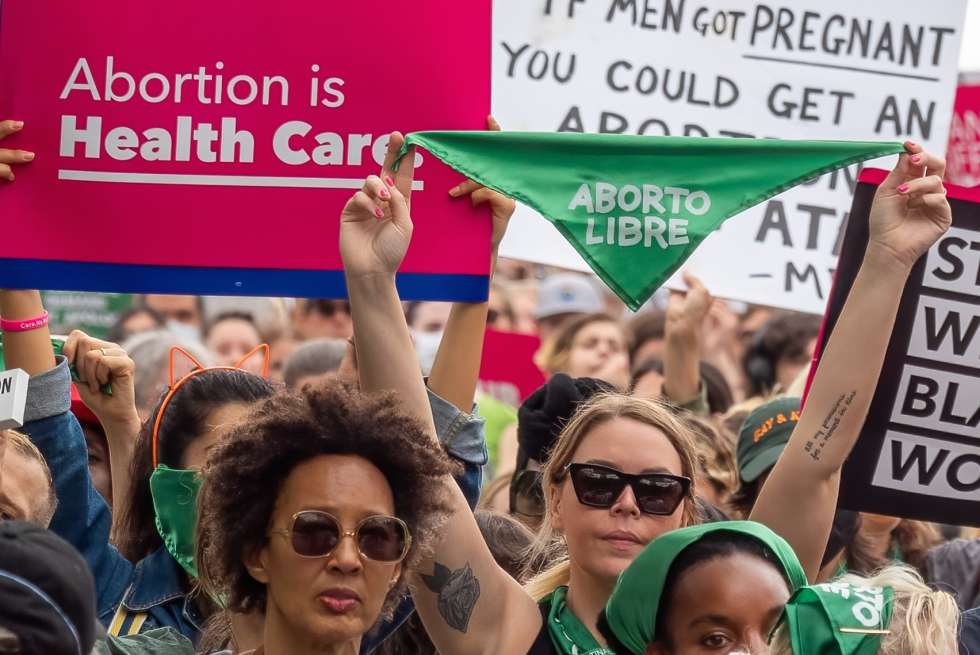“It’s Part of Reproductive Life”: Lessons from the Irish Abortion Rights Movement on the Importance of “Ordinary” Stories
From the Series: After Roe
From the Series: After Roe

My biggest issue was the centering of the fatal fetal anomaly cases. There was no space for someone to say, “I just didn’t want to be pregnant” or “I already had two children.” Those kinds of everyday decisions that people make, and they’re valid decisions too. And again, the media being hungry for the horror stories, people that had been raped. Rather than just saying, “This is a thing that happens, people have sex, people get pregnant, people have abortions, it’s part of reproductive life.”
These were the words of Muireann, an Irish abortion activist who canvassed door-to-door for several months in early 2018, encouraging the public to vote “Yes” in the upcoming referendum to repeal Ireland’s “pro-life” 8th amendment. In March 2018, the Together for Yes campaign was launched as an umbrella organization for all of Ireland’s pro-choice activists. Its messaging coalesced around three themes: encouraging voters to have compassion for abortion-seekers, to extend care to pregnant people in their own country, and to prioritize change to an unworkable status quo. As Muireann describes, the Irish campaign focalized the necessity of abortion in the cases of fetal anomaly, abortions for medical emergencies, and the experiences of abortion-seekers whose pregnancies constituted a risk to their physical health.
As Muireann explains, too, there was no space in the Irish campaign for the testimonies and experiences of abortion-seekers who wanted to end their pregnancies simply because it was unintended or undesired. In fact, the campaign’s relentless focus on “tragic” abortion experiences worked to reinscribe the idea of a moral hierarchy of “acceptable” versus “unacceptable” abortions (O’Shaughnessy 2022, 6). As Australian sociologist Erica Millar writes, efforts to forge a connection between abortion and “tragedy,” by focusing on stories of violence or ill-health, for example, reproduces the idea of the fetus as a “grievable object” and obscures the “subject position of the unwillingly pregnant woman, for whom abortion could be considered a life-affirming ‘good thing’” (2017, 135, 97).
While the Irish campaign was undoubtedly successful—the constitutional abortion ban was overturned by a margin of 66 percent—where the campaign arguably failed was in terms of destigmatizing abortion more broadly. This failure to destigmatize abortion has effects both in terms of the shape of the laws and policies inserted to regulate abortion access after legalization, and in relation to the experiences of abortion-seekers who must still contend with harassment from antiabortion activists outside doctors’ offices and refusal of care from medical practitioners. As Irish legal scholar Fiona de Londras argues, the focus on “tragic” cases inside of the Irish parliament has resulted in “modest” abortion law reform that has failed to dislodge “the core propositions of the natalist state” (2020, 2).
With eyes on the Irish campaign, I urge activist colleagues in the United States not to forgo a focus on consciousness-raising and destigmatizing work, and to remember the political and symbolic importance of “ordinary” abortion stories. As reproductive justice scholars and activists have taught us, having the “right” to abortion does not mean that all of those who require abortion will be able to access it, or that they will be able to access it in an environment free from violence (Luna and Luker 2013). Abortion stigma remains a huge barrier to abortion access in Ireland. Recent reports have illustrated that abortion-seekers and abortion providers continue to face social stigma, which can manifest in discriminatory treatment from medical staff toward abortion-seekers, or social isolation for medical practitioners providing care (Dempsey et al. 2021).
In the aftermath of the Dobbs ruling, abortion activists in the United States should be careful to avoid framing their arguments in ways that construct abortion as an “unpleasant” necessity, required to “save” abortion-seekers from pain and suffering, and which contributes unintentionally to increasing abortion stigma. Overemphasizing the cases of abortion-seekers in “crisis” situations—for example, where the pregnancy in question has been diagnosed with a fetal anomaly—reproduces the misogynistic idea that abortion-seekers must suffer in order to “qualify” for the care they seek. This is particularly pertinent for activists in the United States where, since Roe v. Wade was overturned in June of this year, we can already see a heavy focus in mainstream media discourse on the consequences of abortion bans that do not carry exceptions for fetal abnormalities.
As Muireann alludes to above, abortion is an ordinary part of the complex, mundane, reproductive lives of women and pregnant people. The sharing of ordinary abortion stories, then, is an important activist tool that fosters solidarity among abortion-seekers, and which challenges the social malignment and political marginalization of abortion care. Meanwhile, abortion activists and scholars must continue in our work to foreground the realities of abortion as part of reproductive life—and even as a social good necessary to bring about true social justice—for all individuals regardless of their status along the various axes of reproductive oppression.
De Londras, Fiona. 2020. “‘A Hope Raised and Then Defeated’? The Continuing Harms of Irish Abortion Law.” Feminist Review 124, no. 1: 33–50.
Dempsey, Brendan, Mary Favier, Aoife Mullally, and Mary F. Higgins. 2021. “Exploring Providers’ Experience of Stigma Following the Introduction of More Liberal Abortion Care in the Republic of Ireland.” Contraception 104, no. 4: 414–19.
Luna, Zakiya, and Kristin Luker. 2013. “Reproductive Justice.” Annual Review Law Social Science 9: 327–52.
Millar, Erica. 2017. Happy Abortions: Our Bodies in the Era of Choice. London: Zed.
O’Shaughnessy, Aideen Catherine. 2022. “Triumph and Concession: The Moral and Emotional Construction of Ireland’s Abortion Rights Movement.” European Journal of Women’s Studies 29, no. 2.